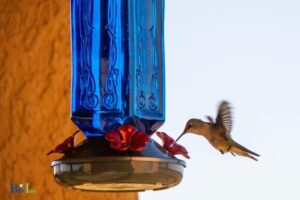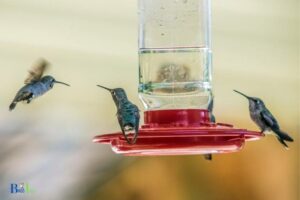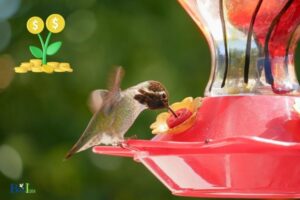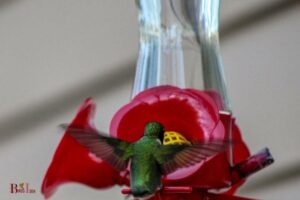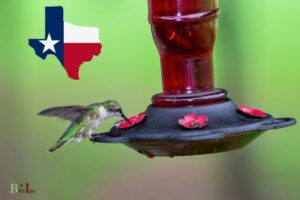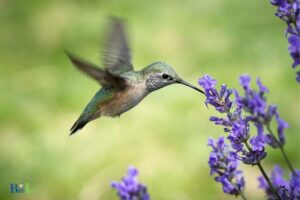When Do Hummingbirds Stop Feeding at Night?
Hummingbirds typically stop feeding at night when the sun sets and enter a state called torpor to conserve energy.
As daylight fades, hummingbirds cease their feeding activities and find a safe place to rest for the night. They enter a hibernation-like state called torpor, which allows them to lower their metabolism and save energy.
During torpor, their body temperature and heart rate significantly decrease, making it appear as if they are lifeless.
Torpor is essential for hummingbirds’ survival, as their high-energy lifestyle requires an immense amount of food to maintain.
By entering torpor at night, they can conserve their energy reserves and avoid having to forage for food in the dark, when their vision is limited and predators are more active.
This energy-saving strategy allows them to continue their high-energy activities during the day when they can easily locate and access food sources.
7 Time of Day Hummingbirds Stop Feeding at Night:
| Time of Day | Hummingbird Feeding Activity |
| Morning | Begin feeding at sunrise |
| Mid-morning | Active feeding |
| Afternoon | Active feeding |
| Late Afternoon | Decreased feeding activity |
| Evening | Feeding slows down |
| Dusk | Last feeding before night |
| Night | Stop feeding |
Key Takeaway

Five Facts About: Hummingbirds Feeding at Night
Understanding The Feeding Behaviour Of Hummingbirds
Hummingbirds are fascinating creatures that have unique feeding patterns that differentiate them from other birds.
These small birds can consume up to twice their body weight in nectar each day, making them some of the most active feeders in the avian world.
To fully understand the feeding behaviour of hummingbirds, it’s essential to look at the factors that affect their feeding patterns.
The Role Of Daylight In Hummingbirds’ Feeding Pattern
Hummingbirds are diurnal, which means they are active during the day and sleep at night. Daylight plays a crucial role in their feeding patterns because it provides them with the energy they need to survive.
During the day, hummingbirds visit flowers to feed on nectar, which is their primary source of energy.
As the sun sets, the flowers close, and the hummingbirds’ feeding activity decreases.
Why Hummingbirds Feed More During The Day Than At Night
Hummingbirds feed more during the day than at night because their metabolic rate is highest during the day.
The metabolic rate of a hummingbird is very high, and they are constantly burning energy, so they need to consume food frequently to maintain their energy levels.
At night, their metabolic rate decreases, and they enter a state of torpor, which is similar to hibernation. This allows them to conserve energy and survive during the nighttime when food is scarce.
The Impact Of Temperature On Hummingbirds’ Feeding Behaviour
Temperature also affects hummingbirds’ feeding behaviour. In cooler temperatures, hummingbirds will feed more frequently to maintain their energy levels, whereas in hotter temperatures, they will reduce their feeding activity to conserve energy.
This is why you’ll often see hummingbirds more active during the cooler parts of the day, such as early morning and late evening, and less active during the hottest parts of the day.
Understanding the feeding behaviour of hummingbirds is essential to appreciate these fascinating creatures fully. Factors such as daylight, metabolic rate, and temperature all play a role in their feeding patterns.
By knowing these factors, we can appreciate the complexity of hummingbirds’ feeding behaviour and ensure that we take the necessary steps to protect them from environmental threats.
The Science Behind Hummingbirds’ Feeding Behaviour
Hummingbirds are fascinating creatures that have captured the interest of many bird enthusiasts. Everyone is aware that hummingbirds feed on nectar, but do they feed at night?
This blog post will examine when hummingbirds stop feeding at night and the science behind their feeding behavior.
Understanding The Biological Clock Of Hummingbirds
Like all living beings, hummingbirds have a biological clock that helps them to regulate their feeding, sleeping, and migration patterns.
For hummingbirds, their biological clock is regulated by a group of cells in the hypothalamus known as the suprachiasmatic nucleus.
This nucleus is responsible for controlling the circadian rhythms of hummingbirds, which helps them to know when to feed and sleep.
The Role Of Circadian Rhythms In Hummingbirds’ Feeding Pattern
The circadian rhythms of hummingbirds play a crucial role in their feeding behavior. Hummingbirds have specific times during the day when they feed and when they rest.
During the day, they feed multiple times, and during the night, they rest and conserve energy.
Hummingbirds’ circadian rhythms are influenced by various factors such as sunlight, temperature, and food availability.
Factors That Influence The Circadian Rhythms Of Hummingbirds
Hummingbirds’ circadian rhythms are influenced by several factors, including:
- Sunlight: Sunlight exposure can significantly impact the circadian rhythms of hummingbirds, which is why they have a set schedule for feeding and resting.
- Temperature: Temperature can also affect the circadian rhythms of hummingbirds. When it’s too hot or too cold, hummingbirds may alter their feeding behavior to conserve energy.
- Food availability: Food availability is another crucial factor that influences the circadian rhythms of hummingbirds. If there is a limited supply of food, hummingbirds may need to adjust their feeding and resting schedules accordingly.
How Hummingbirds Adapt To Changing Light Conditions
Hummingbirds are well adapted to changing light conditions, including those caused by artificial light sources.
They have excellent vision and can see in low-light conditions, which helps them to feed early in the morning, late in the evening, and even during cloudy days.
Besides, hummingbirds can adapt to artificial light sources such as streetlights, which can change their feeding behavior.
Hummingbirds are extraordinary creatures with a unique feeding behavior which is affected by many factors, including their biological clock and circadian rhythms.
By understanding the science behind hummingbirds’ feeding behavior, bird enthusiasts can appreciate and admire these beautiful birds even more.
The Timing Of Hummingbirds’ Feeding Behaviour
When Do Hummingbirds Stop Feeding At Night
Hummingbirds are fascinating creatures that can be seen flitting around in gardens and backyards throughout the day.
They are known for their distinctive feeding behaviours and can often be seen feeding on nectar from flowers. But, have you ever wondered when hummingbirds stop feeding at night?
In this post, we will explore the timing of their feeding behaviour, focusing on when hummingbirds typically start feeding in the morning, how long they feed during the day, and when they last feed before dusk.
We’ll also examine some of the factors that influence the timing of their feeding behaviour.
When Do Hummingbirds Typically Start Feeding In The Morning?
Hummingbirds are early risers and tend to start feeding at the crack of dawn. The optimal time for feeding is right after sunrise when the nectar is freshest.
This is usually between 6:00 and 7:00 am, and hummingbirds can be seen flitting from flower to flower, collecting nectar to fuel their day.
How Long Do Hummingbirds Feed During The Day?
Hummingbirds are active birds and can feed for up to 10 hours a day. They take frequent breaks to rest, but when they are feeding, they move quickly from flower to flower, sipping nectar as they go.
Hummingbirds need to consume about half of their body weight in nectar each day to maintain their high energy levels, so they are always on the lookout for fresh nectar sources.
When Is The Last Time Hummingbirds Feed Before Dusk?
As the day draws to a close, hummingbirds start preparing for the coming night. They tend to stop feeding about 30 minutes before sunset to conserve energy and find a safe place to roost overnight.
The last feeding time can vary depending on the season and the availability of food sources, so it’s essential to monitor their feeding behaviour to get a sense of their patterns.
Factors That Influence The Timing Of Hummingbirds’ Feeding Behaviour
Several factors can influence the timing of hummingbirds’ feeding behaviour, including:
- Weather: Hummingbirds tend to feed more frequently on hot, sunny days when nectar sources are abundant. In cooler weather, they may take longer breaks between feedings.
- Food availability: When nectar sources are scarce, hummingbirds may need to feed more frequently to maintain their energy levels. They may also start feeding earlier or later in the day to find food.
- Competition: Hummingbirds can be territorial and may need to defend their feeding grounds from other birds. When competition is high, they may need to feed earlier in the day or later in the evening to avoid conflict.
- Migration: During the migration season, hummingbirds may adjust their feeding behaviour to conserve energy for their long journey. They may need to feed more frequently or for longer periods to prepare for their flight.
Hummingbirds are fascinating creatures with unique feeding behaviours that are influenced by a variety of factors.
By understanding their patterns, we can appreciate these magnificent birds and provide them with the resources they need to thrive.
The Effect Of Environmental Factors On Hummingbirds’ Feeding Behaviour
When it comes to hummingbirds, they are known as some of the most intriguing birds in the world. Watching their rapid wing flapping and taking in their vibrant hues can be quite awe-inspiring.
One thing that has always interested many hummingbird enthusiasts is their feeding behavior.
Specifically, at what point do hummingbirds stop feeding at night? The answer to this question is not so simple, as many environmental factors play a critical role in their feeding habits.
Here are some of the key environmental factors that affect hummingbirds’ feeding behavior:
The Impact Of Temperature On Hummingbirds’ Feeding Pattern
Hummingbirds are quite sensitive to temperature changes, which can drastically affect their feeding pattern.
Here is what you should know:
- Hummingbirds often feed more frequently in cool weather than hot weather.
- If the temperature falls below 40°f, hummingbirds may go into a state of torpor, which is a type of hibernation to conserve energy. This state can last for hours, and they may not eat during this time.
The Role Of Daylight In Hummingbirds’ Feeding Behavior
Daylight plays an essential role in a hummingbird’s feeding behavior.
Here is what you should know:
- Hummingbirds are diurnal, which means they are active during the day and sleep at night.
- Hummingbirds wait for daybreak to start feeding, and they will continue to feed throughout the day until dusk.
How Humidity Affects Hummingbirds’ Feeding Behavior
Humidity can have a dramatic effect on hummingbirds and their feeding behavior.
Here is what you should know:
- High humidity levels can negatively affect hummingbirds’ wing flapping and make flying more challenging, thus making it harder for them to land on flowers and feed.
- When the humidity is high, hummingbirds often seek shade and wait for cooler weather for feeding.
The Impact Of Flowers And Food Availability On Hummingbirds’ Feeding Behavior
Flowers and food availability play a crucial role in hummingbirds’ feeding behavior.
Here is what you should know:
- Hummingbirds are picky eaters and prefer nectar-rich flowers for feeding.
- They will often visit the same set of flowers until the nectar is depleted, and then, they will move on to a new set of flowers to feed from.
- If there is a lack of flower or food availability in the area, hummingbirds may migrate to another location in search of food.
Hummingbirds are fascinating creatures that operate based on several environmental factors to dictate their feeding behavior. Changes in temperature, daylight, humidity, and food availability can all have a significant impact on when they choose to feed.
By understanding these factors, you can better appreciate and attract hummingbirds to your garden or backyard.
Can Hummingbirds Feed At Night?
When Do Hummingbirds Stop Feeding At Night
Hummingbirds are creatures of habit, with feeding patterns mostly consistent with daylight hours. But what happens at night?
Do they stop feeding, or is it possible for them to continue? Let’s find out!
Do Hummingbirds Stop Feeding Completely At Night?
The answer is yes, but not entirely. During the night, hummingbirds enter torpor, a state of inactivity where their metabolic rate slows down to conserve energy.
During torpor, hummingbirds sleep and do not engage in any feeding activity.
The Role Of Light In Hummingbirds’ Feeding Behaviour
Light plays a crucial role in hummingbirds’ feeding behaviour, as these birds require a certain level of light to see their food sources.
As the sun goes down and light levels decrease, hummingbirds gradually reduce their feeding activity until they stop altogether during the night.
Factors That Determine Hummingbirds’ Feeding Behaviour At Night
Different factors contribute to the hummingbirds’ feeding behaviour at night.
Here are some of the most significant ones:
- Availability of food sources: If there aren’t any food sources near the hummingbirds’ roosting area, they’re unlikely to feed at night.
- Temperature: Hummingbirds’ metabolism is linked to environmental temperature. If it’s too cold, they’ll go into a deeper state of torpor and reduce their feeding activity accordingly.
- Humidity: Humidity affects the humidity of the nectar, which may spoil faster in high humidity, making it less appealing for hummingbirds.
- Time of year: During migration, hummingbirds may feed at night to store up more energy for their long journey.
Can Artificial Light Affect Hummingbirds’ Feeding Pattern At Night?
Artificial light can interfere with hummingbirds’ feeding pattern at night, especially in urban areas where light levels are high. These birds’ eyes are sensitive to certain wavelengths of light, particularly blue and green light.
Artificial light can disrupt their sleep patterns and reduce their feeding activity, as they become disoriented and unable to find their food sources.
While it’s possible to see hummingbirds feeding at dusk and dawn, these birds do not feed at night because of their inactivity during torpor.
If you want to attract hummingbirds to your feeder, ensure it’s placed in an area with ample natural light and away from artificial light sources that may disrupt their feeding patterns.
FAQ For When Do Hummingbirds Stop Feeding At Night
When Do Hummingbirds Stop Feeding At Night?
How Much Nectar Do Hummingbirds Consume?
Do Hummingbirds Migrate At Night?
How Can I Attract More Hummingbirds To My Yard?
Conclusion
Hummingbirds are incredible creatures that fascinate many birdwatchers and nature lovers worldwide. As we have seen, hummingbirds need to consume a lot of nectar to survive, especially during the breeding season.
Their feeding patterns change throughout the day and season, and it’s essential to provide them with a consistent source of food to thrive.
Although there are no specific hours for when hummingbirds stop feeding at night, it’s important to be aware of the temperature, light, and food availability in the area.
By understanding their habits and behaviors, we can enjoy the wonder that these tiny birds bring to our lives while helping them survive in their natural habitat.
Remember to keep your hummingbird feeders clean, full, and well-lit during the dark hours, and you’ll be able to enjoy their stunning aerial acrobatics for years to come.

